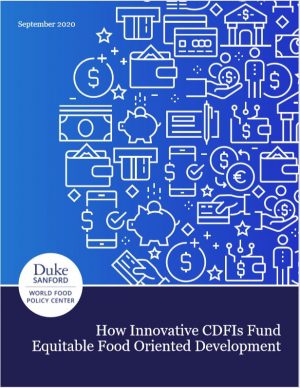Published: September 2020
Authors: Lianna Gomori-Ruben
We Meet Businesses Where They Are
This report explores how three Community Development Financial Institutions (CDFIs) drive economic growth in low-income and historically marginalized communities through Equitable Food Oriented Development (EFOD), a community development model that supports locally owned food-based economies (EFOD Collaborative, 2019). The report presents an overview of systemic financial barriers that business owners and aspiring entrepreneurs face in marginalized communities. The EFOD framework illustrates the types of lending and investing needed to support such businesses. Some financial institutions are more effective than others at providing this support. This research seeks to understand the practices of CDFIs that are effective funders of EFOD in their communities.
This research explored the following questions:
- What are different underwriting and lending approaches that a financial institution can employ to support EFOD-aligned enterprises?
- What institutional shifts are needed from financial institutions for more equitable lending practices?
- How are innovators in the field of community development spreading their impact to other practitioners?
Three CDFIs were selected to participate in this case study. Data was collected through semi-structured interviews aimed at understanding alignment with the principals of the EFOD model and analyzed for common themes.
The findings indicate that these CDFIs successfully impacted marginalized communities in alignment with the EFOD model. The CDFIs developed place-based practices to provide products and services in direct response to their communities’ needs.
Six themes of practice emerged in the analysis:
- Cultivating trust to identify opportunity. Successful CDFIs rely upon networks to identify borrowers, funders, and technical assistance providers. They recognize the importance of building trust with the communities they serve and prioritize resources towards that end.
- Amassing and deploying flexible capital. Successful CDFIs focus on building a large fund with capital that can be customized into financial services that meet their borrowers’ needs.
- Underwriting with relationships. Effective CDFIs invest in their relationships with their borrowers to mitigate risk. By establishing coaching partnerships, these CDFIs support businesses to grow and to manage their repayment obligations.
- Designing products and services in a bottom-up fashion. Successful CDFIs assess businesses individually to identify the most impactful interventions for them rather than apply a one-size-fits-all approach.
- Developing localized expertise. Effective CDFIs develop extensive expertise in the communities they serve. Social, economic, and environmental knowledge along with robust partnership networks enable them to identify innovative opportunities.
- Responding to local systemic barriers. Successful CDFIs identify systemic barriers that burden their communities and take action to change them.
The themes of practice identified in this research can provide guidance for lenders seeking to restructure their practices to better support EFOD in their communities. Further research is needed into the relationship between CDFI funding sources and their ability to implement EFOD, as well as models for structuring successful partnerships between CDFIs and EFOD organizations. This research was funded by the World Food Policy Center at the Duke Sanford School of Public Policy and conducted in partnership with DAISA Enterprises.

